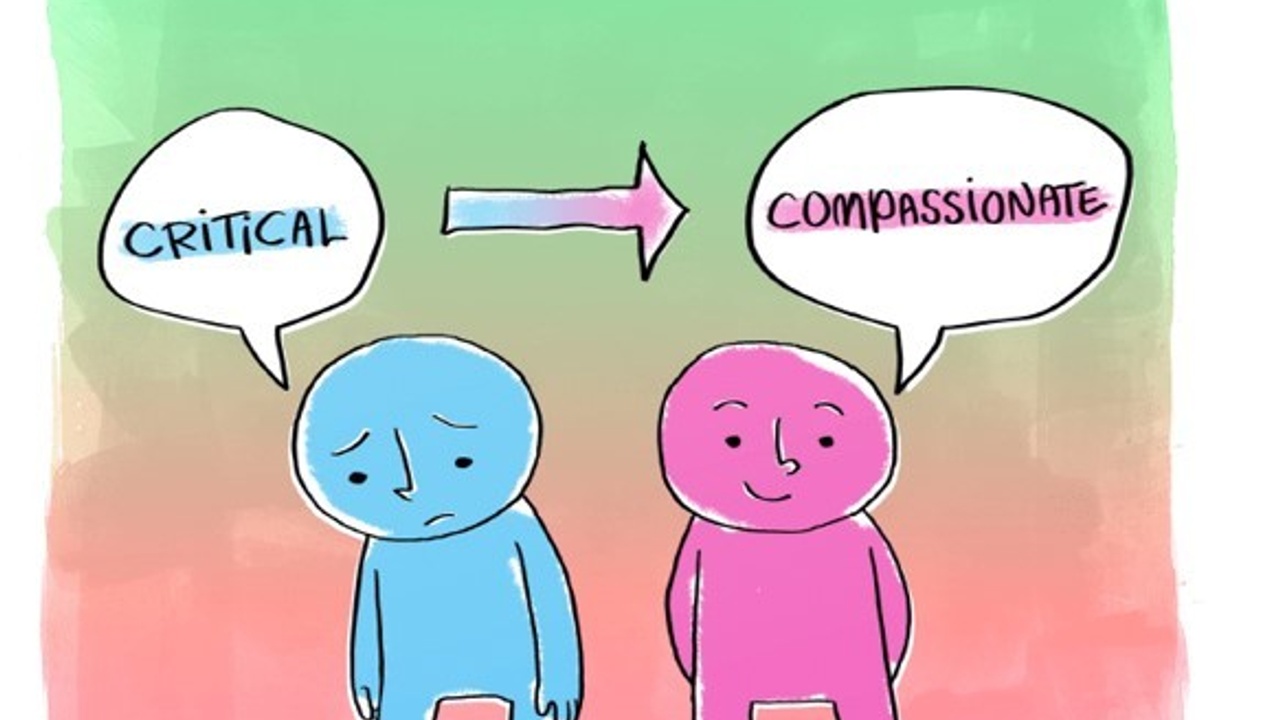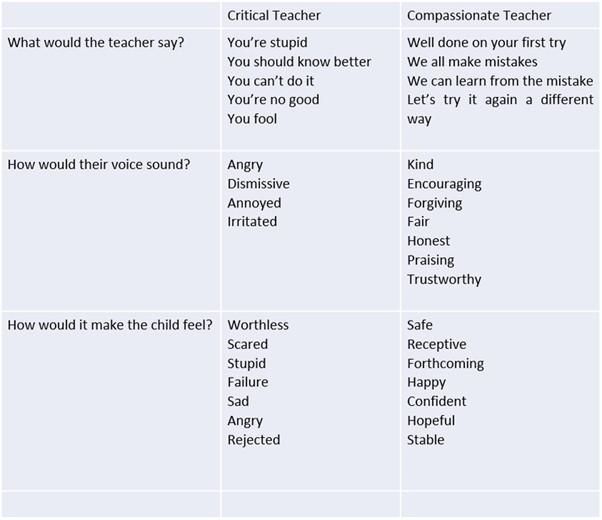The Critical Vs Compassionate Teacher

This blog article comes from an individual who uses our services at Meridian Wellbeing. We share the personal story and empowerment of those who have struggled with their mental health.
When I was poorly with my mental health I attended a few group CBT sessions. My attention span was pretty low but there were a few group sessions that I could relate to, and one in particular was called The Critical Vs Compassionate Teacher. I was paired up with a young lad and we had to answer the following question:
Scenario: A child has done something wrong or made a mistake. There are two teachers:
A: The Critical Teacher
B: The Compassionate Teacher
Myself and my partner listed two different ways of how the critical teacher and the compassionate teacher would speak to a child after making a mistake. The table below is the result of our work; it certainly shows better results from the child if you apply the compassionate teacher style.

For me personally, I know I am more receptive to a kind and compassionate approach; you will always get the best out of me if I’m spoken to in this manner. I also apply loyalty and commitment, and I may even go the extra mile! I would like to think that it works both ways and that I operate the same way with people on a daily basis.
I have a question for you… How do you respond to yourself when you have made a mistake? What voice in your head do you first hear? Is it the Critical Teacher? Or is it the Compassionate Teacher?
For example, you’ve made an easy mistake. You’ve double booked yourself! You can’t make both appointments. Roll on the teachers…
CRITICAL TEACHER: What a stupid mistake to make. I should have double checked my diary first. I’m going to look stupid now. What will people think of me?
COMPASSIONATE TEACHER: It was an honest mistake. I can contact my friend/family/doctor/ with a brief explanation that I have double booked myself and need to reschedule the appointment. I will double check my diary before I make this new appointment. I can fix this. The appointment will still happen but on a different date.
I hope this is a good example. We may be good at giving others helpful and compassionate advice, but when it comes to our own thoughts and actions, we often give ourselves a hard time! It can often be the critical teacher on our shoulder whispering into our ear when we make a mistake. But we can really benefit from allowing ourselves to hear more from our compassionate teacher.
Challenge your inner Teachers…
We have the power within us to be kinder to ourselves, and yes it’s easier said then done but with accumulative practice, even with small steps, we have the chance to help ourselves. And that’s got to be worth a go right?
- The first step towards challenging our inner critical teacher is to aim to become aware of it. It may be that, like many of us, your self-critical voice is so common you don’t even notice when it is present. Whenever you’re feeling bad about something, think about what you’ve just said to yourself. Try to be as honest as possible. Are there key phrases that come up over and over again? What is the tone of your voice – harsh, cold, angry? Does the voice remind you of any one in your past who was critical of you? We’re aiming to listen and to learn about our inner self-critic that we’re not consciously aware of.
- Make an active effort to soften the self-critical voice, but do so with compassion rather than self-judgment. E.g don’t say ‘you’re such a fool’ to your inner critic, because it’s not an eye for an eye! Speak up to your critical voice, say something like ‘I know you’re worried about me and feel unsafe, but you are causing me unnecessary pain. Could you let my inner compassionate voice say a few words now?”
- Listen to what your inner compassionate voice has to say. It may have been repressed somewhere along the way in life’s travels, but it sits on our other shoulder and is also prepared to whisper in our ear. We will hear more compassionate words such as ‘you are trying’ and ‘look how far you have come’ and ‘we can learn from that mistake’ and ‘I’ll do that a different way next time’.
- Once we have listened, and really heard, what our compassionate voice has to say, we are then able to re-frame the observations made by our self critical voice in a kinder and friendly way. If you’re having trouble thinking of what words to use - you may want to imagine what a compassionate friend would say to you in a situation.
This isn’t an overnight fix and we’re not going to always get it right, but more importantly we don’t always have to get it right. But with practice, we can get better at it. Eric Clapton didn’t become the ‘Clapton is God’ guitar player he is today without practice. David Beckham didn’t ‘bend it like Beckham’ without practice. And we say it to our children often enough, well I know that I do, when we tell them ‘you just need to practice’.
If this all sounds too much for you, if you can’t see how your inner critical teacher can be tamed, then be kind to yourself and look back at the original table at the beginning of this blog – The Critical Teacher vs the Compassionate Teacher. Because it’s all there! This one, easy to view table, really does show us the knock on effects of both of these teachers, and the child that is taught by the compassionate teacher is the happy and confident child.
At the end of the day, we are all still big kids at heart.
